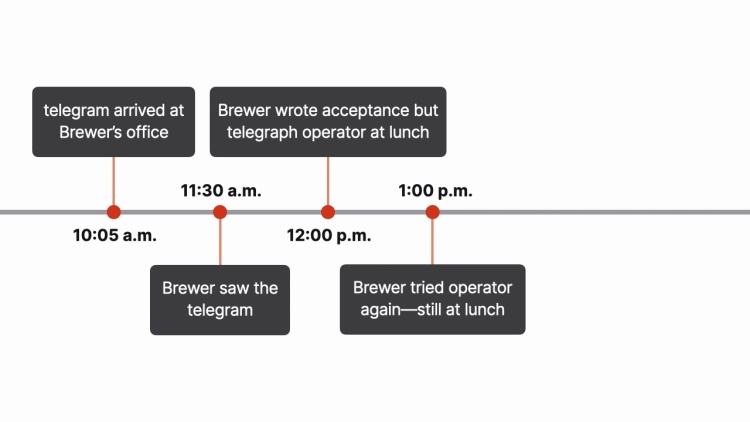Brewer v. Lepman
Missouri Court of Appeals
127 Mo. App. 693, 106 S.W. 1107 (1908)

- Written by Kate Luck, JD
Facts
Louis Lepman (defendant), an egg dealer, sought to purchase a carload of eggs from J. E. Brewer (plaintiff) for 18 cents per dozen. Lepman sent Brewer a telegram offer at 10:00 a.m. requesting eggs shipped that day at 18 cents per dozen and specifying that prompt wire acceptance was required. Brewer sent a telegram accepting the offer after 2:00 p.m. and shipped the eggs. Lepman replied that it was too late, but that he would accept the eggs at a discounted rate. Brewer sued Lepman for breach of contract. Brewer explained that he could not have sent word of his acceptance any sooner because he did not receive the offer until he arrived at his office at 11:30 a.m. and, although Brewer attempted to send word of his acceptance at 12:00 p.m., the telegraph operator routinely left for dinner at that time. After checking back around 1:00 p.m. and finding that the telegraph operator had not yet returned, Brewer left for his dinner. Brewer was finally able to transmit the telegram acceptance after he returned from his own dinner after 2:00 p.m. At trial, the trial court judge instructed the jury that the term prompt wire acceptance meant as soon as reasonably possible under the circumstances. The jury ruled in favor of Brewer. Lepman moved for a new trial, and the court granted Lepman’s motion. Brewer appealed.
Rule of Law
Issue
Holding and Reasoning (Ellison, J.)
What to do next…
Here's why 907,000 law students have relied on our case briefs:
- Written by law professors and practitioners, not other law students. 47,100 briefs, keyed to 996 casebooks. Top-notch customer support.
- The right amount of information, includes the facts, issues, rule of law, holding and reasoning, and any concurrences and dissents.
- Access in your classes, works on your mobile and tablet. Massive library of related video lessons and high quality multiple-choice questions.
- Easy to use, uniform format for every case brief. Written in plain English, not in legalese. Our briefs summarize and simplify; they don’t just repeat the court’s language.





